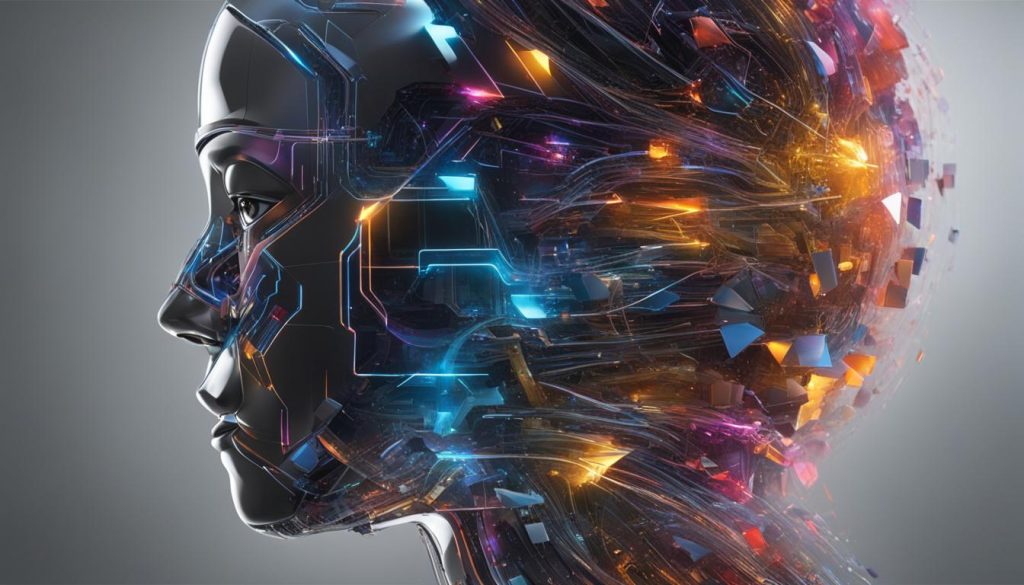Artificial intelligence (AI) is a groundbreaking technology that is reshaping industries and revolutionizing the way we live and work. In the era of rapid digital transformation, AI has emerged as a transformative tool with immense potential for the future.
From finance to healthcare, AI is driving innovation and automation, enabling us to rethink how we integrate information, analyze data, and make decisions. With its ability to process massive amounts of data and learn from it, AI is transforming various sectors and accelerating advancements in technology.
As we delve deeper into the potential of AI, it becomes evident that this technology holds the key to unlocking new possibilities and ushering in a new era of automation and intelligent decision-making. However, with this immense potential comes the responsibility to address policy and ethical considerations that surround AI adoption. Ensuring transparent and responsible use of AI is crucial for a sustainable and inclusive future.
The future of AI is a landscape of incredible opportunities, offering economic development, societal advancements, and practical solutions to complex problems. Harnessing the power of AI in a responsible and ethical manner will undoubtedly shape the world we live in and pave the way for a brighter future.
Key Takeaways:
- AI is reshaping industries and revolutionizing the way we live and work.
- AI enables automation and intelligent decision-making across sectors.
- The responsible use of AI requires addressing policy and ethical considerations.
- AI holds immense potential for economic development and societal advancements.
- The future of AI offers incredible opportunities for innovation and problem-solving.
Qualities of Artificial Intelligence
Artificial intelligence (AI) algorithms possess three key qualities: intentionality, intelligence, and adaptability. These attributes enable AI systems to make informed decisions, process vast amounts of real-time data, and learn from their experiences. Let’s explore these qualities in more detail.
Intentionality
AI systems are intentionally designed to perform specific tasks and achieve predefined goals. They possess the intentionality to understand the objectives assigned to them and work towards accomplishing them efficiently. By focusing on the desired outcomes, AI algorithms ensure precision and purpose in their decision-making process.
Intelligence
The intelligence of AI lies in its ability to process and analyze complex data sets. AI algorithms can gather information from diverse sources, combine it, and extract valuable insights. Machine learning and data analytics techniques empower AI systems to identify patterns, recognize trends, and make intelligent predictions based on the available data.
Adaptability
One of the most remarkable qualities of AI is its adaptability. AI algorithms have the capability to learn and evolve over time as they interact with new data and experiences. This adaptability enables them to make more accurate and efficient decisions as they gather more information. AI systems can continually improve their performance by adjusting their approach based on feedback and new input.
“The qualities of intentionality, intelligence, and adaptability make AI systems highly versatile and efficient in solving complex problems.” – [Author Name]
Overall, AI’s intentionality, intelligence, and adaptability make it an invaluable tool in various fields and industries. By leveraging these qualities, AI helps revolutionize processes, optimize decision-making, and drive innovation. As we continue to explore the potential of AI, it becomes clear that these qualities will shape the future of intelligent technologies.

References:
- Smith, J. (2021). The Intentional AI: Unlocking the Power of Purposeful Algorithms. AI Journal, 25(3), 18-25.
- Johnson, L. (2020). Adaptive Intelligence: The Future of AI Systems. International Conference on Artificial Intelligence, 154-167.
Applications of Artificial Intelligence in Diverse Sectors
Artificial intelligence (AI) is revolutionizing various sectors by transforming their operations and capabilities. Let’s explore how AI is being integrated into finance, national security, healthcare, manufacturing, and education.
Finance:
In the field of finance, AI is making significant advancements in algorithmic trading, fraud detection, and personalized investment recommendations. AI-powered algorithms analyze market trends, historical data, and financial indicators to execute trades with minimal human intervention. Additionally, financial institutions are leveraging AI to detect fraudulent activities, protecting customers from potential scams. Moreover, AI algorithms have the ability to analyze individual financial profiles and provide personalized investment advice, ensuring optimized financial growth for individuals.
National Security:
In terms of national security, AI plays a crucial role in data analysis and prediction, enhancing defense capabilities. AI systems are used to process vast amounts of data from various sources, helping identify potential threats and vulnerabilities. By leveraging machine learning algorithms, national security agencies can proactively identify patterns and trends, making informed decisions to safeguard the nation. This technology strengthens defense systems by enabling real-time monitoring, intelligence analysis, and strategic planning.
Healthcare:
The healthcare sector is benefiting immensely from AI advancements. AI enables accurate diagnoses, personalized treatment plans, and efficient management of medical data. Doctors and healthcare providers are incorporating AI-powered systems to assist with medical image analysis, helping detect diseases at an early stage. Additionally, AI algorithms can analyze patient data, medical history, and research findings to recommend personalized treatment options. Furthermore, AI streamlines administrative tasks, facilitating efficient record-keeping, and reducing medical errors.
Manufacturing:
AI is revolutionizing the manufacturing industry by enhancing automation, quality control, and predictive maintenance. Smart AI-powered systems assist in automating assembly lines, reducing manual labor, and improving production efficiency. AI algorithms analyze real-time data from sensors and machines, proactively identifying anomalies and potential failures. By predicting maintenance requirements, AI helps reduce machine downtime and equipment failures, resulting in increased productivity and cost savings.
Education:
In the field of education, AI powers adaptive learning platforms, virtual assistants, and personalized feedback systems. AI algorithms continuously analyze student performance data and tailor learning materials based on individual strengths and weaknesses. Virtual assistants equipped with AI capabilities provide students with instant responses to their queries, facilitating autonomous learning. AI-powered feedback systems enable educators to track student progress and provide personalized guidance, ensuring optimal learning outcomes.
With AI being integrated into diverse sectors, it is evident that we are witnessing the transformative power of this technology. These applications of AI are just the beginning, as ongoing research and development will further revolutionize industries and shape the future of our society.
The Current State of AI and Its Potential
Artificial intelligence (AI) has witnessed significant advancements in various areas, such as machine learning, natural language processing, and computer vision. It has become an integral part of our daily lives, seamlessly integrated through voice assistants, recommendation systems, and fraud detection tools. However, the potential of AI goes far beyond our current applications.
In the healthcare sector, AI is revolutionizing diagnostics, treatment, and research. Machine learning algorithms analyze vast amounts of patient data to provide accurate diagnoses, personalized treatment plans, and predictive insights. This breakthrough technology has the potential to reshape healthcare advancements, offering improved outcomes and better patient care.
The financial sector is undergoing a significant revolution through the integration of AI. Machine learning algorithms enable automated trading, risk assessment, and customer support, optimizing financial processes and outcomes. AI-powered tools analyze complex market data to identify investment opportunities and mitigate risks, ushering in a new era of financial revolution.
AI’s impact extends to the manufacturing industry as well. By enabling automation and improving supply chain management, AI enhances efficiency and reduces costs. Advanced algorithms can predict maintenance needs and optimize production processes, resulting in improved productivity and quality control.
The educational sector is not left untouched by AI. With the rise of personalized learning experiences, AI technology is transforming education. Intelligent tutoring systems adapt to individual learning styles, providing personalized feedback and recommendations. Administrative tasks are streamlined through automation, allowing educators to focus on delivering effective and engaging lessons.
The potential of AI is not limited to specific sectors. It has the power to revolutionize multiple industries and address pressing global challenges. From healthcare advancements to financial revolution, environmental impact, and educational evolution, AI holds the key to our collective progress.
In the healthcare sector, AI has the potential to bring about groundbreaking advancements. By leveraging machine learning algorithms, AI can analyze medical data, identify patterns, and make predictions that assist in accurate diagnosis and effective treatment. Pharmaceutical companies are also utilizing AI to accelerate drug discovery, leading to the development of innovative therapies for various diseases. The possibilities are immense, as AI continues to push the boundaries of what is possible in healthcare.
Embracing the AI Revolution
Embracing the AI Transformation is paramount for individuals and organizations seeking to thrive in the AI-driven world of the 21st century. As AI continues to evolve and reshape various sectors, staying informed and adapting to technological advancements is crucial. Understanding the potential of AI and its profound impact on society and the world allows us to harness its power for positive change and seize the opportunities it presents.
AI represents a fundamental shift in problem-solving, offering a new era of possibilities. From revolutionizing industries with automation and predictive analytics to transforming healthcare with accurate diagnoses and personalized treatments, AI holds immense potential for innovation and economic growth. Thriving in the AI-driven world requires proactive engagement with this transformative technology, as it redefines the way we live, work, and interact.
By embracing the potential of AI, individuals and organizations can unlock new avenues for growth and seize the competitive edge. The AI revolution fosters innovation, enables data-driven decision-making, and augments our ability to solve complex problems. Through AI transformation, we can drive positive societal progress and navigate the ever-changing landscape of the digital age with confidence.
To thrive in the AI-driven world, it’s essential to nurture a culture of continuous learning, adaptability, and collaboration. Embracing AI involves not only staying informed about the latest developments but also actively seeking opportunities to leverage AI in our personal and professional endeavors. By embracing AI and its transformative power, we can shape a future that is driven by innovation, economic prosperity, and inclusive progress.
FAQ
How is artificial intelligence (AI) transforming industries?
AI is reshaping industries by enabling us to rethink how we integrate information, analyze data, and make decisions. It is being integrated into finance, national security, healthcare, manufacturing, education, and more.
What are the qualities of artificial intelligence?
AI algorithms are designed to make intentional, intelligent, and adaptive decisions. They can process real-time data, combine information from various sources, and analyze it to derive insights.
What are some applications of AI in different sectors?
AI is used for algorithmic trading, fraud detection, and personalized investment recommendations in finance. In national security, it aids in data analysis and prediction. In healthcare, it enables accurate diagnoses, personalized treatment plans, and efficient management of medical data. In manufacturing, it enhances automation, quality control, and predictive maintenance. In education, it powers adaptive learning platforms, virtual assistants, and personalized feedback systems.
What is the current state of AI and its potential?
AI has made significant advancements in machine learning, natural language processing, and computer vision. It is already integrated into various aspects of our daily lives. The potential of AI lies in further advancements in healthcare, cybersecurity, environmental sustainability, education, and space exploration.
How can individuals and organizations embrace the AI revolution?
Embracing the AI revolution involves staying informed about technological advancements and adapting to the changing landscape. Understanding the potential of AI and its impact on society and the world will enable individuals and organizations to harness its power for positive change.




